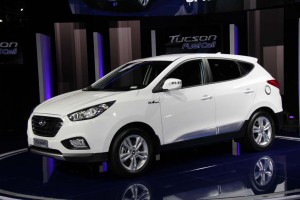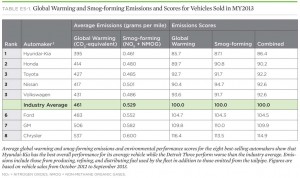
Hyundai is just bringing its Tucson-based hydrogen fuel-cell vehicle to market in Southern California.
While Japanese automakers have long worked hard to burnish their images as environmentally friendly manufacturers, Korean carmaker Hyundai-Kia has been named the greenest carmaker by an influential scientific research group.
The Korean partners displaced Tokyo-based Honda, which had been the top-ranked automaker during the previous five years, according to the Union of Concerned Scientists. The UCS credited Hyundai’s belated push into hybrids, as well as its new, downsized turbo engines and other pollution control technologies, such as the hydrogen-powered Tucson Fuel Cell Vehicle just going on sale in California.
Honda slipped to second in the study, followed by Toyota, Nissan and Volkswagen. Detroit’s Big three automakers lagged in the study which looked at a variety of variables, including the production of traditional, smog-causing pollutants, as well as CO2 and other gases linked to climate change.
But in a significant development, the Massachusetts-based UCS noted that all eight of the manufacturers now are producing less global warming gases, on average, than they did when the research group’s first study was conducted in 1998.
“In addition, tailpipe emissions of smog-forming pollutants from the average vehicle have decreased by 87% since 2000,” noted the Union’s vehicle analyst Dave Cooke. “This shows that the standards we at UCS have advocated so strongly for are working.”
The study did not include smaller automakers, notably Tesla Motors, the California-based start-up that produces only zero-emission battery-electric vehicles.
The ascension of Hyundai might come as a surprise to some observers considering the maker was one of the last of the major automakers to enter the battery segment and has only a limited number of hybrids available at the moment, with no pure battery-electric vehicles or plug-in hybrids. Hyundai’s first hydrogen vehicle, a version of its Tucson crossover, is only just reaching showrooms in Southern California, but it is a year ahead of new fuel-cell vehicles under development by Honda and Toyota.
And Hyundai – along with sibling Kia — was one of the first makers to abandon six-cylinder engines with its midsize range, shifting to more fuel-efficient – and cleaner – naturally aspirated and turbocharged fours.
“As Hyundai-Kia works to further improve fuel economy and electrify its fleet, Honda will need to step up its innovation if it wants to take back the crown,” the report noted.
The annual UCS Automaker Rankings report does come in for some fire by critics who say it places full-range manufacturers at a disadvantage. While Hyundai does offer a small number of large luxury cars, such as the V-8-powered Genesis and Equus – it has no pickups or full-size SUVs in its line-up.
Honda, the long-time green leader, according to UCS, offers only one car-based pickup, the slow-selling Ridgeline, and has no V-8s in its own line-up. It actually marketed its own hydrogen car, the FCX, several years ago, and was the first to market a hybrid-electric vehicle in the U.S., but its sales have lagged those of rival Toyota. The Japanese giant’s Prius is the world’s top-selling hybrid model, which has also been one of the best-selling vehicles of all forms in California in recent years. But Toyota has a number of large trucks and crossovers and offers several V-8 engines that hurt its overall CO2 emissions score.
Detroit makers, meanwhile, are heavily dependent upon their truck-based products, such as the Ford F-Series, long the country’s top-selling vehicle. Ford also has a number of plug-in and pure battery-electric models, while GM was first to market with a mainstream plug-in, the Chevrolet Volt, launched in 2009.
In its latest report, the Union of Concerned Scientists noted that the industry still has a long way to go in barely more than a decade as it strives to meet the tough 54.5 mpg fuel economy standard going into effect in 2025.
“While automakers have widely used a few key technologies to reduce the global warming impact of their fleets, other technologies on the horizon are also important,” the UCS stressed.
Manufacturers are not only introducing new powertrain technologies – such as turbos, hybrids and battery-cars — but also adopting newer lightweight materials, such as aluminum and carbon fiber. The 2015 Ford F-150 will shed as much as 700 pounds weight, and while the automaker has yet to announce specific mileage numbers, that is expected to yield significant improvements that could markedly improve its score on the UCS charts in the next few years.

